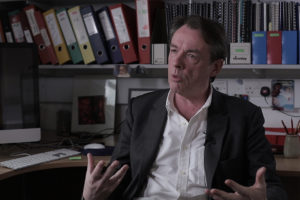Genetics of Obesity and Diabetes
Epidemiologist Nick Wareham on leptin, type 2 diabetes, and genome-wide association studies
At the moment, perhaps the main environmental concern for fresh water is climate change. Climate change is not just global warming; it’s also changes in precipitation in different regions. For example, as the climate gets warmer in the future, this will cause, for example, the Asian monsoon to change where it falls most in different countries. So, in terms of freshwater security, this is going to cause problems for potentially billions of people.
Climate change is just the latest kind of threat to fresh waters. I would say that in the 1980s, it had to do with freshwater certification and acid rain; in the 1990s, it had to do with nutrients from agriculture. In the 1990s, going into the 2000s, we realized that the temperature was the highest in maybe the last 1,000 years and global warming became a major environmental concern. So, climate change can affect fresh water in many ways.
Global warming also causes lakes themselves to warm up during the summertime, and that can be problematic because when lake water becomes warmer, warmer water becomes lighter, and it sits on top of the lake. That means that some species, like one-celled algae called diatoms, or the glass shell, become too heavy, sink out of the light zone and start to die off. In their place, we have these smaller algae, which can form dangerous algal blooms such as cyanobacteria. When the algae die, they start to respire more, and they use up all the oxygen, and that can cause dead zones again in lakes. If it’s got no oxygen, you’ve got a dead zone, and that means that fish can no longer live there as well.
So we’re seeing that in many lakes now the global warming is causing these dead zones to become more common, and that could be problematic.
From a recent survey of lakes from around the world, we know that the majority of them are heating up in the summertime. Again, we don’t really know what’s going to happen with them all; the responses will be different depending on where in the world you are. If you go to tropical lakes, for example, they’re already very warm, so imagine that global warming is going to warm these lakes even further. Some of their species are uniquely adapted to growing in these warm waters; if it gets even warmer, that may be at the physiological tolerance of some species, and then those species might start to die out. What we’re seeing in some of the tropical lakes in East Africa, these large deep tectonic lakes is that we’re already seeing some lost species and some loss of productivity in these lakes that is linked directly to global warming.
Some lakes that exist in regions are semi-arid, so they’re reliant on precipitation, evaporation, etc; they exist in desert regions basically. If we’re going to have changes in rainfall and, say, we have less rainfall, then those lakes are going to start to dry up, and if they start to dry up, that means they become more salty. Then they become too salty for organisms to live there,, and those organisms start to die out. That’s exactly like the Aral Sea: What we saw there is that all the fish died out because the lake dried up to such an amount that it became too salty.
When the water becomes salty, there’s the problem that humans can’t drink it either.
So we have these different ways of how climate change is going to affect lakes in the future in different parts of the world that can be problematic. It can get worse; so we know that, for example, nutrients cause a problem for lakes and that they can also cause algal blooms when the lake warms up, so if you’ve got nutrients coming into the lake from agriculture and the lake gets warmer at the same time, we have these interacting stressors that can actually make the situation even worse. In many lakes, for example, in South America Lake Valencia, we’re seeing the effects of this: we’ve got these massive algal blooms, then there’s really rapidly increasing dead zones and then the death of fish and other organisms.
There’s another nice case study; I’m saying a nice case study, but it’s not a nice case study; it’s an awful case study: this is Lake Poopó in South America. It’s very sensitive to changes in evaporation, but also, in the lake’s catchment, there is lots of mining going on there. Mining is producing a loss of toxic heavy metals that’s getting into the lake via the rivers, so the lake is becoming really stressed. There are well-documented changes in lake water quality, which is problematic for the people who rely on the lake but also causing species to become threatened: they’re starting to die off as well. In 2014-2015, there was a major extreme event in the climate linked to El Niño that caused the lake to heat up a lot, which caused the lake to have these algal blooms, which means that the oxygen was lost. And because of the unique condition at the time, the wind blew the water that had no oxygen into the coastline where all the fish were living, and that meant millions of fish died out as well.
I think people can adapt to changes around lakes and rivers if the change is gradual. So lakes are heating up, but it will heat up over decades, and I think people will just have to adapt their economies because they can’t control global warming. It’s when you have an extreme event, say, you have a massive flood, for example, where we have an increase in hurricane intensity or an increase in typhoon intensity in Southeast Asia when that brings vast amounts of water coming in, that water hits the mountains, hits a catchment, rivers burst their banks, they bring in lots and lots of soils, contaminants etc into the lake, — that you can’t prepare for, or it’s less easy to prepare for that.
So a lot of the work that’s going on the moment is in looking at adaptation to these extreme events and looking at disaster resilience as well, to try to work out, if we do have an increased intensity of hurricanes or typhoons or monsoons, how can we adapt to that? How can populations adapt to that? Lake levels might be increasing; that means that you don’t build beside a lake, you don’t build on a river floodplain if you think that you can have more flash floods, which are going to come from global warming, because of course as the atmosphere warms up it can hold more moisture. But now moisture got to go somewhere, and that’s why we’re seeing even in southern England these major rainstorms that happen in there that cause flooding. So there are local adaptations that people can make: don’t build on floodplains. Those are some of the things that are key, but of course, that takes a lot of will. It takes a lot of governments to make decisions that will have an impact on policy decades in advance, and governments can be slow to do that, which I think is a bit unfortunate.

Epidemiologist Nick Wareham on leptin, type 2 diabetes, and genome-wide association studies

Neuropsychologist Chris Frith on mirror neurons, compassion, and how it depends on the sentiment towards the s...

Biogerontologist David Gems on the innate plasticity in aging, senolytic drugs and whether we should expect dr...